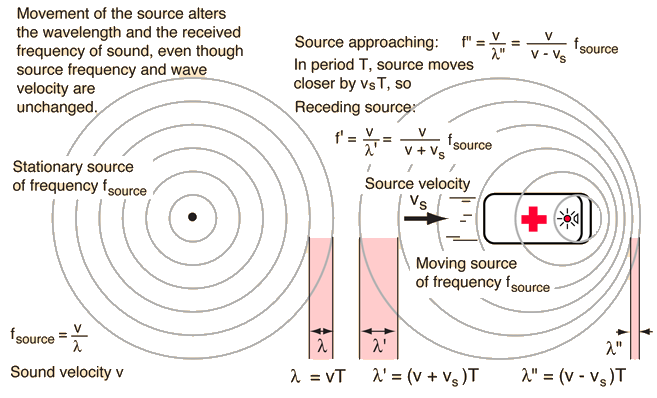Sound
Have you ever noticed that when a police car or an ambulance drives past you, the pitch of the siren seems to become lower? This is the Doppler Effect. In these cases, the siren is getting closer to you at first. During that time, the vehicle is "chasing" the sound waves made by the siren. Once the vehicle passes you, the sound waves you are hearing are now "chasing" the siren.
The siren is the source of the sound, so the waves emanate from it in all directions. Since the siren is not stationary, the origin point of each wave is along a line. This causes the distance between the leading edge of the wave to be smaller than the distance between the trailing edges of the waves.
The sound registers as a higher pitch at first because the waves are hitting your ears at smaller intervals.
The siren is the source of the sound, so the waves emanate from it in all directions. Since the siren is not stationary, the origin point of each wave is along a line. This causes the distance between the leading edge of the wave to be smaller than the distance between the trailing edges of the waves.
The sound registers as a higher pitch at first because the waves are hitting your ears at smaller intervals.
Picture copyright C.R. Nave, 2014, Georgia State University
Because sound waves can only travel so fast, it is possible for the source of the sound to actually "beat" the front of the wave to the observer. When this happens, the Doppler Effect still governs the relative sounds that we hear from the front edge and rear edge of the waves, but the object creating the sound has already passed by the time we hear it.
This is referred to as "breaking the sound barrier," and it is commonly achieved by fighter jets. Below is a video of the noise that accompanies breaking the sound barrier, appropriately nicknamed a "sonic-boom."
This is referred to as "breaking the sound barrier," and it is commonly achieved by fighter jets. Below is a video of the noise that accompanies breaking the sound barrier, appropriately nicknamed a "sonic-boom."
